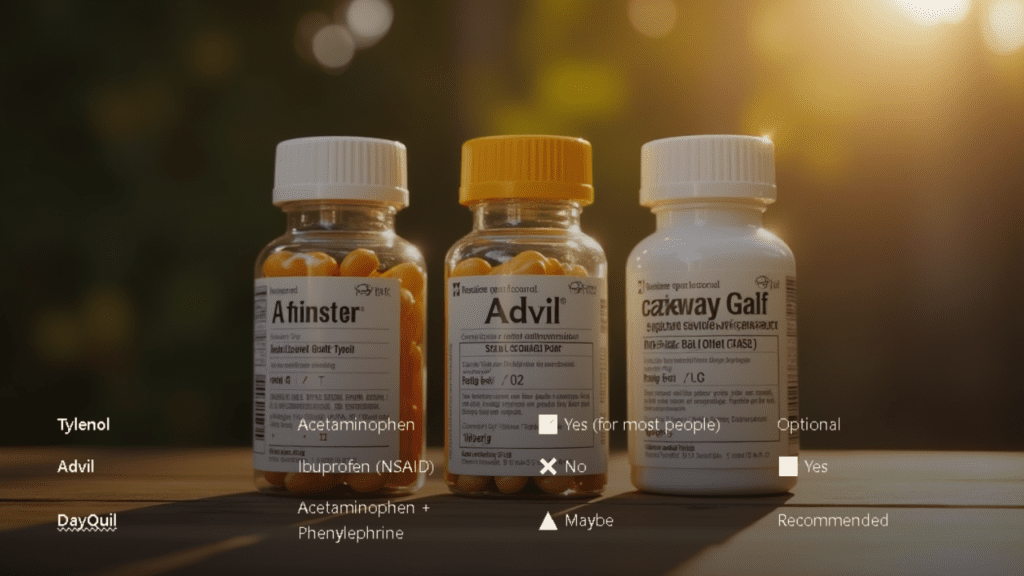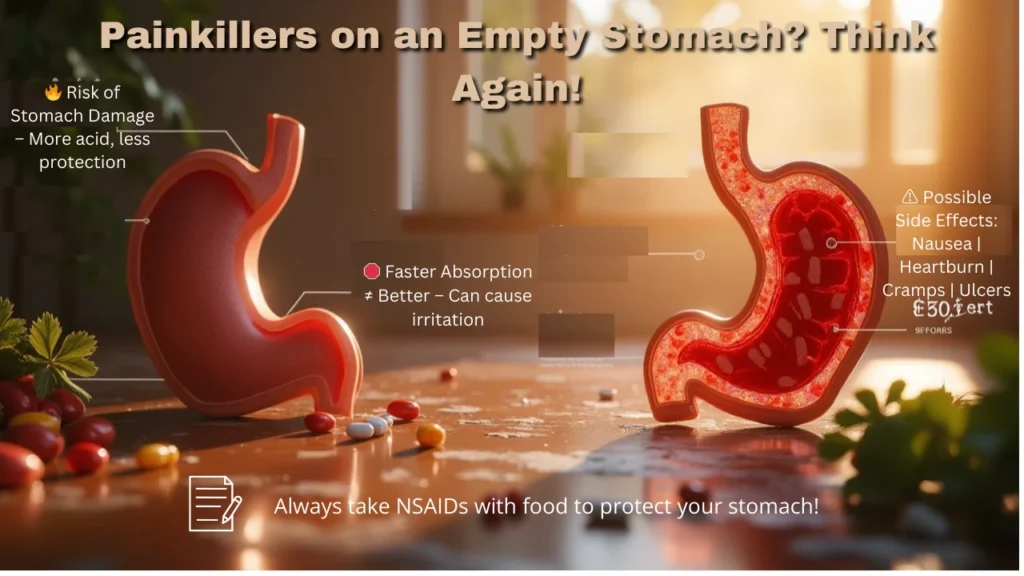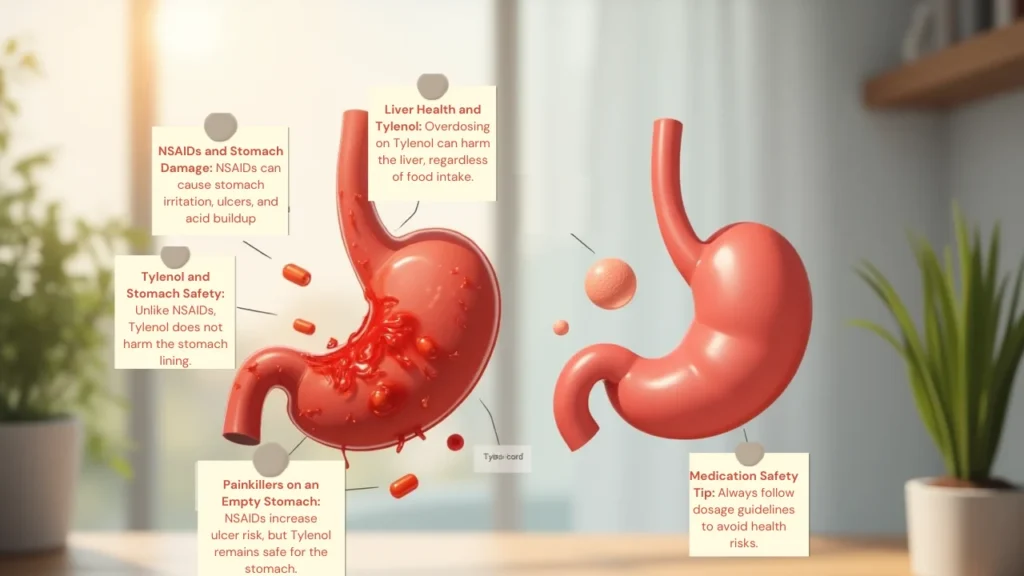Introduction
Tylenol (acetaminophen) ranks among the most popular OTC medications for managing pain and reducing fever. Millions of people rely on it daily for headaches, muscle pain, and general discomfort.
Can You Take Tylenol on an Empty Stomach
But what if you need relief right away and haven’t eaten? Is it safe to take Tylenol on an empty stomach, or is that a bad idea? Many people assume all pain relievers must be taken with food, but the answer isn’t that simple.
In this guide, we’ll break down how Tylenol works, whether it’s safe to take without food, and how it compares to other pain relievers like Advil and DayQuil.
Understanding Tylenol (Acetaminophen)

What is Tylenol?
Tylenol contains acetaminophen, which helps to ease pain and lower fever. Unlike ibuprofen (Advil) and aspirin, which belong to the NSAID (nonsteroidal anti-inflammatory drug) family, Tylenol does not reduce inflammation.
How Does Tylenol Work?
Tylenol works by blocking pain signals in the brain rather than reducing inflammation in the body. This makes it a preferred choice for people with sensitive stomachs or those who cannot take NSAIDs due to medical conditions.
Why does this matter for your stomach?
NSAIDs like Advil can irritate the stomach lining because they reduce protective compounds in your gut. Tylenol, however, is gentler on the stomach since it doesn’t work the same way. But does that mean it’s 100% safe to take without food?
Can You Take Tylenol on an Empty Stomach?

The short answer: Yes, most people can take Tylenol on an empty stomach without issues. According to the FDA, acetaminophen doesn’t require food to be effective or safe for short-term use.
But there’s a catch:
- Liver concerns: High doses of Tylenol (over 4,000 mg/day) can harm your liver, especially if combined with alcohol. Always follow dosage instructions.
- Nausea risk: A small percentage of people may feel queasy if they take Tylenol without food. If you’re prone to stomach sensitivity, pair it with a cracker or banana.
Expert Opinions on Taking Tylenol Without Food
Medical professionals generally agree that Tylenol can be taken with or without food. However, some individuals may experience mild nausea or discomfort, especially if they have a sensitive stomach.
Pro Tip: If this happens, drinking water or taking Tylenol with a light snack (such as crackers or toast) can help.
How Does Tylenol Compare to Other Pain Relievers?

Not all pain relievers are created equal. Let’s compare three common options:
| Medication | Active Ingredient | Safe on Empty Stomach? | Best With Food? |
|---|---|---|---|
| Tylenol | Acetaminophen | ✅ Yes (for most people) | Optional |
| Advil | Ibuprofen (NSAID) | ❌ No | ✅ Yes |
| DayQuil | Acetaminophen + Phenylephrine | ⚠️ Maybe | Recommended |
Why DayQuil Needs Caution
DayQuil contains acetaminophen plus decongestants and cough suppressants. While the acetaminophen itself is stomach-safe, other ingredients (like phenylephrine) may cause nausea or dizziness on an empty stomach.
Advil’s Risks
Ibuprofen can irritate the stomach lining, increasing the risk of ulcers or bleeding. The American Gastroenterological Association advises always taking NSAIDs with food or milk.
Experts strongly recommend taking Advil with a meal or milk to protect the stomach lining.
What Happens If You Take Painkillers Without Food?

Your stomach isn’t just a pouch—it’s a complex environment. Here’s how medications interact with it:3
- Faster Absorption: An empty stomach allows pills to dissolve quicker, which sounds good… until it isn’t.
- Irritation: NSAIDs like Advil block enzymes that protect your stomach lining, leading to acid buildup.
- Symptoms to Watch For:
- Nausea
- Heartburn
- Stomach cramps
- Ulcers (with long-term NSAID use)
Expert Insight:
“Food acts like a buffer,” says Dr. Sarah Thompson, a board-certified internist. “For NSAIDs, it’s non-negotiable—always eat first.”
Best Practices for Taking Tylenol Safely
- When You’re in a Hurry: Grab a small, bland snack like toast, applesauce, or a handful of crackers.
- Hydrate Well: Water helps medications dissolve and reduces stomach irritation.
- Never Double Dose: Always follow the recommended limit (typically 3,000–4,000 mg per day for Tylenol).
- Avoid Alcohol: Mixing painkillers with alcohol increases liver and stomach risks.
- Check Labels: Some cold medicines (like NyQuil) already contain acetaminophen—don’t mix with Tylenol!
- When in Doubt, Ask: Pharmacists are your free resource for medication safety.
👉 Looking for a reliable pain reliever? Try for fast and effective relief.
- Product Links (USA):
Common Myths and Misconceptions About Tylenol

Does Tylenol Cause Stomach Ulcers?
No. Unlike NSAIDs, Tylenol does not damage the stomach lining or increase the risk of ulcers.
Can Tylenol Harm Your Liver on an Empty Stomach?
Exceeding the recommended dose of Tylenol can harm your liver, but this isn’t affected by whether you take it with or without food.
Conclusion
Is taking Tylenol on an empty stomach safe? Yes, for most people, it’s safe. Unlike Advil and other NSAIDs, Tylenol is gentler on the stomach and does not cause irritation. However, if you have a sensitive stomach, you may prefer to take it with a small snack.
For long-term use, always follow the recommended dosage and consult a doctor if you have concerns about your medication.
Worried about pain? Discover the painless way to pull a loose tooth for kids and adults.
Important Safety Note:
⚠️ The information in this article is for educational purposes only and does not substitute professional medical advice. Always consult your doctor or pharmacist before taking Tylenol, Advil, DayQuil, or any medication—especially if you have pre-existing conditions (e.g., liver disease, ulcers), are pregnant/breastfeeding, or take other medications. Dosage, safety, and interactions vary by individual. Never ignore or delay seeking medical guidance based on content you read online.
This blog is not affiliated with Tylenol, Advil, or DayQuil brands. For emergencies, contact poison control (1-800-222-1222) or visit the nearest healthcare provider.
FAQs
1. Is it better to take Tylenol with or without food?
Tylenol can be taken on an empty stomach, but if you experience nausea, taking it with food may help.
2. What should I do if Tylenol upsets my stomach?
Drink a full glass of water and consider eating a light snack to minimize discomfort.
3. How quickly does Tylenol begin to take effect?
Tylenol usually begins working within 30 to 60 minutes after taking it.
4. Can I take Tylenol and Advil together?
Yes, in some cases, doctors recommend alternating Tylenol and Advil for pain relief, but you should consult a healthcare professional first.
5. What are the risks of taking Tylenol too often?
Overuse of Tylenol can lead to liver damage, especially if taken in high doses or combined with alcohol.
Other Related Blog
And if you’re interested in learning more tips and tricks for everyday wellness, feel free to check out my other blogs—they cover a wide range of topics to help you feel your best, no matter the situation!
https://whimsyfy.com/best-watch-brands-luxury-to-affordable-under-1000/
https://whimsyfy.com/can-headphones-cause-hair-loss-science-prevention/


